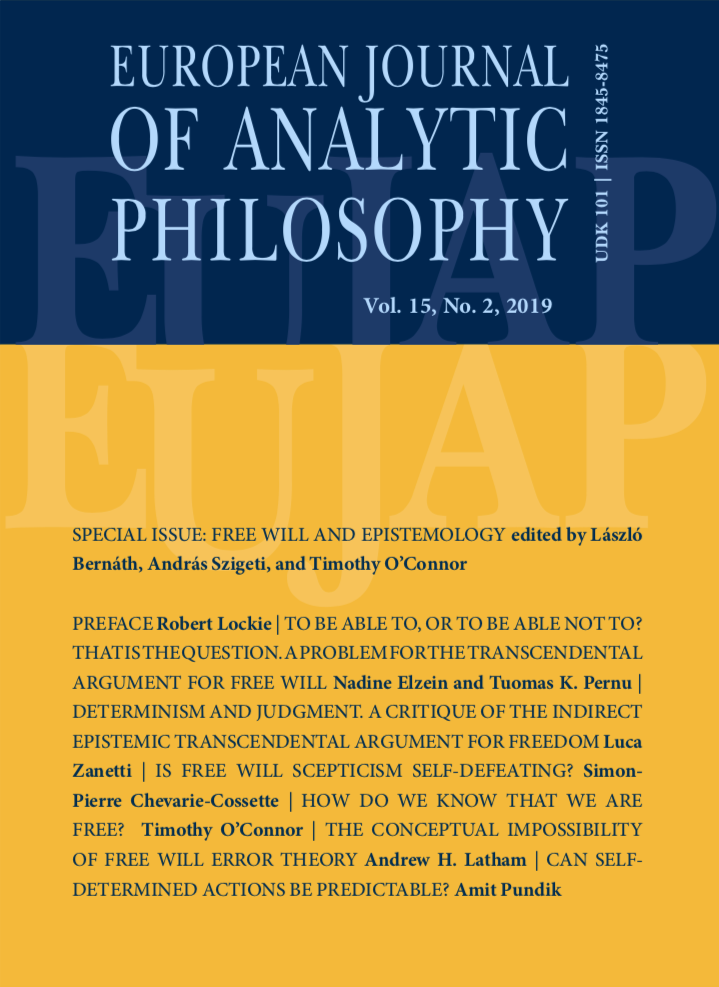- Slingshot Arguments and the Intensionality of Identity
Dale JacquettePages: 5-22 | Abstract
It is argued that the slingshot argument does not soundly challenge the truth-maker correspondence theory of truth, by which at least some distinct true propositions are expected to have distinct truth- makers. Objections are presented to possible exact interpretations of the essential slingshot assumption, in which no fully acceptable reconstruction is discovered. A streamlined version of the slingshot is evaluated, in which explicit contradiction results, on the assumption that identity and nonidentity contexts are purely extensional relations, effectively establishing the intensionality of identity. - Intuitions as Invitations
Patrick FlemingPages: 23-36 | Abstract
Recently, there has been a great deal of skepticism about appeals to intuitions in philosophy. Appeals to intuition often get expressed in the form of what ‘we’ believe. Many people take the ‘we’ in this context to refer to what the folk believe. So the claim about what we believe is an empirical claim. And it looks like the support for this claim comes from a biased sample consisting solely of analytic philosophers. In this paper I want to explain a different way appeals to intuition are used in the literature and why it survives such attacks. The basic idea, which comes from Bernard Williams, is that the ‘we’ used in many appeals to intuitions is not a referring expression at all. The appeal to intuition is not a claim about what any group of individuals believes. Rather it is an invitation to make a judgment. I argue that when you hear a philosopher say ‘P is what we intuitively believe’ the proper response is not ‘who is this ‘we’?’ The proper response is to wonder whether one ought to accept P. - Why Bayesian Coherentism Isn’t Coherentism
Lydia McGrewPages: 37-56 | Abstract
It is sometimes assumed in the Bayesian coherentist literature that the project of finding a truth-conducive measure of coherence of testimonial contents will, if successful, be helpful to the coherentist theory of justification. Various impossibility results in the Bayesian coherentist literature are consequently taken to be prima facie detrimental to the coherentist theory of justification. These attempts to connect Bayesian coherentism to the coherentist/ foundationalist debate in classical epistemology rest upon a confusion between the justification of a proposition and the credibility that a proposition has for some other proposition. Foundationalism requires a class of beliefs that have non- inferential justification, not beliefs that have credibility by themselves for others. Coherentists insist that beliefs can be justified only via inferential relations with others, but this does not mean that coherentists must deny that individual propositions can have credibility for other propositions. I analyze and respond to both Erik Olsson’s and Michael Huemer’s arguments concerning the alleged connection between the Bayesian coherentist project and the coherentist theory of justification. Finally, I argue that Bayesian coherentism as represented in the literature, so far from being a version of coherentism, is implicitly foundationalist because of its treatment of “witness reports”, especially the reports of memory and sensation, as given evidence. The impossibility results, based on the assumption of given reports, are therefore not targeted at classical coherentism in epistemology at all. - Concrete Universals and Spatial Relations
Jani Hakkarainen, Markku Keinänen, and Antti KeskinenPages: 57-71 | Abstract
According to strong immanent realism, proposed for instance by David M. Armstrong, universals are concrete, located in their instances. E.J. Lowe and Douglas Ehring have presented arguments to the effect that strong immanent realism is incoherent. Cody Gilmore has defended strong immanent realism against the charge of incoherence. Gilmore’s argument has thus far remained unanswered. We argue that Gilmore’s response to the charge of incoherence is an ad hoc move without support independent of strong immanent realism itself. We conclude that strong immanent realism remains under the threat of incoherence posed by Lowe and Ehring.

